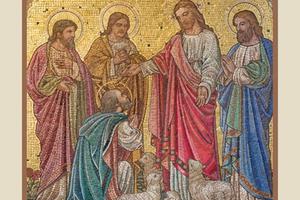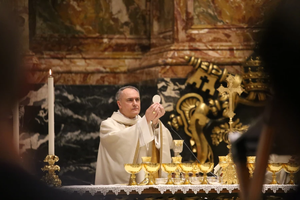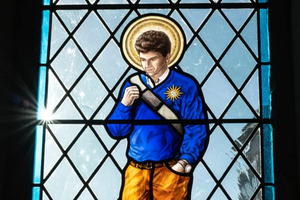Cardinals Sarah, Müller and Burke Encourage Priests Facing Today’s Challenges
At a gathering of Catholic clergy in Rome, the trio of cardinals emphasized the unique and indispensable role of priests at this time in human history.

VATICAN CITY — Cardinals Robert Sarah, Gerhard Müller and Raymond Burke came together in Rome last week to encourage priests in the truth, beauty and goodness of their mission, offering inspiration in the face of opposition not only from the world but also from within the Church.
Addressing the Third International Convocation of the Confraternity of Catholic Clergy, Jan. 13-17, the cardinals consistently emphasized the unique and indispensable role of priests, especially at this time in human history.
The Confraternity of Catholic Clergy is a grassroots association of more than 500 Catholic priests worldwide, with affiliates in Australia, Britain and Ireland. It grew out of the post-conciliar turmoil of the 1970s to encourage clergy to remain priests and stay true to their vocation.
Focusing on the theme of “Truth and Mission of the Priest,” Cardinal Müller stressed that priests are representatives of Jesus Christ and never mere functionaries of a religious system, nor even representatives of their bishop.
The German cardinal told the 75 attending priests, most of whom came from Australia, the U.S. and England, that having been called to be apostles, they are “disciples of the betrayed, condemned and crucified Lord” and so their office is very different from secular positions of power. “We are not prominent personalities,” he said in an unscripted remark.
Priests, the prefect emeritus of the Dicastery for the Doctrine of the Faith continued, “frequently meet with hostility, come up against a wall of silence and find themselves derided as being out of touch with the world.”
They should, therefore, “become aware of the glory of their ministry” so that they can “cope with the sufferings” they will encounter. But he said they also need “comfort” and “spiritual strengthening in their faith” from the Pope, their bishops and religious superiors, who should be “an example and pattern” for priests in their “spiritual and moral life” rather than fomenters of “paternalism and public reprimand.”
Referring to how priests are not immune from becoming “discouraged and depressed,” Cardinal Sarah focused on “Beauty and the Mission of the Priest” and urged the gathered clergy to recall the beauty of their vocation, of their first Holy Mass, and of their witness in bringing the Lord to others, which “remains undiminished — even if we are older, tired or discouraged.”
The African cardinal said that, theologically, beauty is not primarily a question of aesthetics, and certainly not found in the subjectivism of faith, morals or worship — which, he said, is “false,” “not of God,” and “leads souls to hell, not to heaven.”
God alone is beauty, he explained, and the Lord was “the most beautiful man who ever existed [not] because of his physique but because of his integrity, his holiness, his sacrificial dedication to his mission.” He is beautiful “because he is completely given over to the accomplishment of his Father’s will” — something priests, he said, would “do well to consider very carefully.”
Cardinal Sarah, like Cardinal Müller, stressed priests are not functionaries, but nor are they simply called to become an alter Christus — another Christ. More than that, he said, they are ipse Christus, to become Christ himself. By being so, they can carry out the “work of God’s redemptive beauty for the glory of Almighty God, the salvation of souls and the souls we are called to serve.”
“The priest’s vocation is beautiful when it truly participates in the sacrificial self-offering of Christ in the particular circumstances he is called to serve,” the African cardinal said.
Need for Liturgical Beauty
The prefect emeritus of the Dicastery for Divine Worship and the Discipline of the Sacraments underscored the need for liturgical beauty and integrity, denounced inappropriate behaviors during Mass and advocated the “reform of the reform” — a movement to improve the post-conciliar liturgical reforms so they are in continuity, and not in rupture, with the past.
“The liturgical rites we celebrate must be exactly what they are supposed to be — and nothing else,” he twice repeated in his talk. “Herein its beauty lies,” he said, adding that “true celebration” is the center of any Church renewal.
He expressed hope that the reformed liturgical books would be made “even more beautiful,” and as an example of what could be possible, he said he often thinks of the “missal for the ordinariates of former Anglicans and the riches it contains.”
Cardinal Sarah especially urged priests to become acquainted with Benedict XVI’s 2007 apostolic exhortation Sacramentum Caritatis that he said is “very important” for liturgical formation, but which is “very much neglected.” In particular, he said it teaches the ars celebrandi — the art of proper liturgical celebration. The cardinal also underlined that no priest should be required to concelebrate Mass and stressed the importance of beautiful liturgical music, a topic on which he has just completed a book with Peter Carter, founder of the Catholic Sacred Music Project, entitled The Song of the Lamb: Sacred Music and the Heavenly Liturgy.
As for the usus antiquior — the liturgy according to the 1962 Missal that Pope Francis has restricted since 2021 — Cardinal Sarah said despite “clerical attitudes” opposed to it that are “typical of the clericalism that Pope Francis has repeatedly denounced,” he noted how popular it is with young faithful and families. “It has a future because it has a past,” he said, adding that it “cannot be erased or abolished overnight.” He also repeated the “profound truth taught by Pope Benedict” — that “what earlier generations held as sacred remains sacred for us, too” and cannot be “even considered harmful.”
In his talk on “Goodness and the Mission of the Priest,” Cardinal Burke highlighted challenges priests face, such as moral relativism, anti-Catholic agendas, and the marginalization of Christianity in the public sphere.
Urging priests to form consciences according to revealed truth and Catholic Tradition, he encouraged them to “cooperate more efficaciously with the grace of Christ for the transformation of the world” and to open their eyes to “see that many recognize the human bankruptcy of our culture” and are “looking with hope to the Church for the inspiration.”
The American cardinal noted how moral relativism has generated “profound confusion and outright error regarding the most fundamental truths of the moral law” and held up Pope St. John Paul II’s encyclical Veritatis Splendor as one means to counteract this ideology.
“The forces which would lead us down the path of cultural death through the denial of the Christian roots of our culture are strong, and we must be steadfast in encouraging all who are engaged in the battle for life and for a culture of life,” he said. Priests and lay faithful, he added, need to engage in public discourse with fundamental truths of the moral law, as taught by reason and the Catholic faith.
The Cardinals’ Homilies
The cardinals gave further guidance to the assembled clergy in homilies during daily Masses. In the Basilica of St. Mary Major on Jan. 15, Cardinal Sarah's homily focused on encouraging priests in their vocation, emphasizing the importance of prayer, Marian devotion, and calling for renewed commitment to the Church’s mission in the face of contemporary challenges.
In the Basilica of St. Paul’s Outside the Walls on Jan. 14, Cardinal Müller said the corruption of sound doctrine always leads to corruption of morality. True reform of the Church, he said, is not brought about by “secularization of the Church” or the “submission of her leaders to woke ideology” but by the “sanctification of the Pope, the bishops, the priests and deacons and all believers” through “God’s grace for the service of the Kingdom to come.”
The Church, he added, does not gain relevance by taking on the current spirit of the age, or carrying out the agendas of nonbelievers, “but only when she, with the truth of Christ, carries the torch before the world.” The real danger for humanity today, he continued, “consists in the greenhouse gases of sin and the global warming of unbelief and the trans-humanist decay of morality, when no one any longer knows or teaches the difference between good and evil.”
In two separate homilies to the participants, Cardinal Burke underscored in the Basilica of St. John Lateran the centrality of the Holy Eucharist in the Catholic faith and priestly life and encouraged a deeper understanding and devotion to the sacrament as a means of grace and salvation.
In St. Peter’s Basilica the following day, he recalled the witness of St. Anthony, a contemporary and close friend of St. Athanasius who defended the Church against the Arian heresy. “Let us not forget that Arius was a priest,” Cardinal Burke said. “In our own time, confusion, error and division, which are the work of Satan, try to destroy any remnant of a Christian culture in the world” and to lead souls away from eternal life, “which He alone brings us.”
Cardinal Burke urged priests, faced with “preternatural forces bent upon our own eternal damnation” to “always remain firmly anchored to Christ by a life of prayer and penance.” He urged them to “never tire” of deepening their understanding of faith and morals and to “never lose respect” for the Pope and bishops. No matter how great their failings, he added, “let us never cease to recognize and honor the apostolic office” and the “irreplaceable service” of those called to safeguard and hand on the truth and love of Christ.
Also among those giving talks at the conference were American Jesuit Father Joseph Carola, professor of patristic theology at the Pontifical Gregorian University, who gave a reflection on Judas Iscariot in the works of St. Augustine; and the American Dominican Father Ezra Sullivan, professor of moral theology and psychology at the Pontifical University of St. Thomas Aquinas, who spoke of the Lord’s help in troubled times in a talk entitled “Walking on Water.”
- Keywords:
- catholic clergy
- cardinal robert sarah
- cardinal gerhard muller
- cardinal raymond burke
- priesthood
- catholic priesthood

















